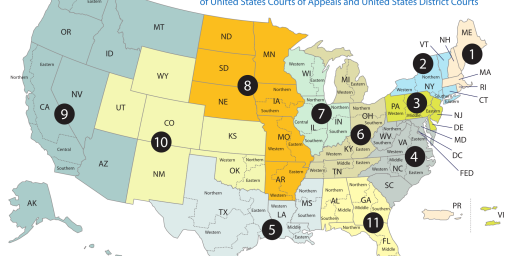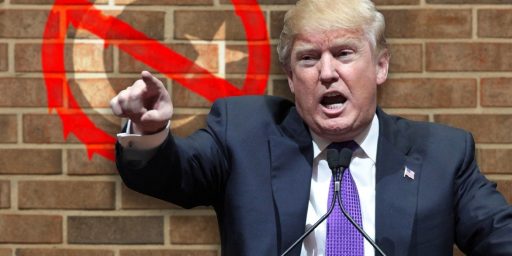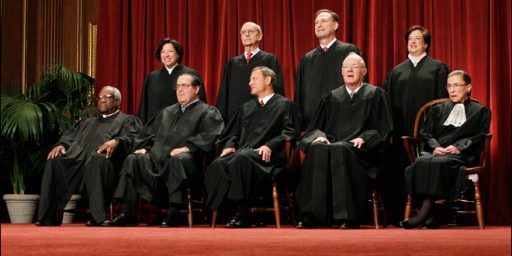Lawrence Tribe: 9th Amendment Hero?
Ramesh Ponnuru has a long investigative piece into a 2003 article by Harvard Law professor Lawrence Tribe in which he claimed, repeatedly, that he singlehandedly “dared” to invoke the dreaded 9th Amendment in his first case before the Supreme Court, in 1980.
Who was I, an utter novice at Supreme Court advocacy, to buck the conventional wisdom on something so basic? Well, I was a lawyer who’d taken a case because he believed in it, who’d been teaching and would teach generations more of law students about the kinds of questions the case raised, who’d gone on record a couple of years earlier in a treatise . . . on most of the issues the case touched, and who cared a lot more about keeping faith with what he’d feel bound to write and teach in years to come, and with how he thought the Court should be approached, than with what the Pooh-Bahs of the establishment thought of him. That’s who I was. And am. So the Ninth Amendment argument stayed in. And, I’m happy to report, in the end it hit its target.
As Ponnuru demonstrates convincingly, Tribe did no such thing. Tribe admits as much but claims Ponnuru is reading more into the article than he actually wrote. The article isn’t available online except for a listing in the table of contents. I’d be interested in seeing it if anyone can access it via WestLaw or some such.
The journal, is called “The Green Bag: An Entertaining Journal of Law,” which is a rather odd title. (I’ve never seen the word “entertaining” in a journal title before.) I doubt “entertaining,” though, is supposed to be a synonym for “fictitious.”
Given that Ponnuru’s claims would be relatively easy to dispute for someone with access to the original article, I’m inclined to believe him. What puzzles me about this is, Why would Tribe inflate his own role in something that strikes me as quite minor? Tribe’s professional reputation, aside from a couple of plagiarism charges, is exemplary. He was widely expected, as early as the mid-1980s, to be appointed to the Supreme Court as soon as a Democratic president had an opportunity. What would he have to gain by boasting about something he didn’t do, especially in a not-particularly-prestigious legal journal, in 2003?
Update (1200): Steven Taylor found the piece via his institutional account and was kind enough to forward it to me. Ponnuru’s account remains fair, in my judgment, although I agree with Tribe that the focus of the piece was primarily personal: How he dealt with arguing his first Supreme Court case while his father was dying and the impact of that grief on his legal judgment, rather than on his heroic fight on the 9th Amendment. This passage is instructive on both counts:
I know that urgent phone calls imploring me, above all else, to forget that “crazy Ninth Amendment argument,” didn’t even scratch the surface of what I was feeling. Literally all I recall [*294] about writing the reply brief — which ended (I’ve just reread it) with a call upon the Court to vindicate “a tradition … demonstrably central to the public awareness and institutional accountability that define our form of government” — is that I refused to use that brief as a vehicle for backing away from the Ninth Amendment, whose affirmation of rights unwritten and unseen I think I was almost beginning to identify, in some then still unconscious way, with the mystery of why I’d fortunately agreed to call my father the night before his anniversary; of why I’d felt the knock of doom before our phone had rung; and, above all, of what I’d seen streaking across the predawn sky out of the airplane window.
Reflecting now on my resolute commitment to arguing the case in Ninth Amendment terms — and thus in terms of the Constitution’s “tacit postulates,” which my opening brief had reminded then-Justice Rehnquist and Chief Justice Burger that they had only recently described as no less “engrained in the fabric of the document [than] its express provisions,” Nevada v. Hall, 440 U.S. 410, 433 (1979) (dissenting opinion) — I think my grief may have permitted me to see a bit more clearly through the fog of superficial arguments and objections and may have steeled me against the kinds of eleventh-hour distractions and importunings that co-counsel, meaning to be helpful, are prone to inject as a Supreme Court argument nears.
Tribe wrote the piece, though, 23 years after the fact. Whether his memory of the relative weight of the 9th Amendment argument, which was minor indeed in his briefs, was faulty at that point is unclear. Again, the advantage to Tribe of self-aggrandizement on this issue is not clear to me.






You might want to see more on this debate at the following links. Tom Goldstein’s analysis of the substance of the article, (linked from the second link below) convincingly shows that Ponuru’s article is largely exaggerated.
http://www.scotusblog.com/movabletype/archives/2005/03/how_bitter_will.html#more
and
http://tribeponnuru.blogspot.com/
The SCOTUSblog piece, at least, says nothing. It doesn’t even bother to make an argument, just dismisses it out of hand.